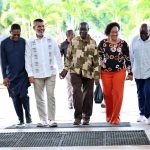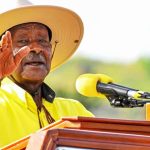Tanzanians flooded the comment sections of government social media pages, as well as the pages of politicians, institutions, local and international bodies, celebrities, and any other platform that allows comments to register their displeasure with the government’s election preparedness. The cement section had one message: No Reform! No Election!

They posted the ‘No Reform, No Election’ slogan in every Tanzanian online comment section that had posted either reels, videos, images, or just a normal statement.
People or institutions that had posted on their ‘statuses and stories’ sections were not spared as the users inboxed them with the same slogan.
No Reforms, No Election is a campaign launched by Tanzania’s main opposition party, CHADEMA, calling for major reforms in the country’s electoral system. The campaign stems from issues the party faced during past elections, including the killing of some of its candidates during the 2024 local government elections, the disqualification of its candidates in several elections since 2020, the spread of fake ballots, and concerns over the independence of the electoral commission.
Chadema Chairman Tundu Lissu, who has been at the forefront of championing electoral reforms, was arrested for inciting the public. He was later charged with treason
CHADEMA has amplified the campaign through rallies, press conferences, and other international platforms, which have since gathered thousands of responses across the country. The campaign has now found its way on social media. Without a celebrity endorsement, viral song, or trending dance, the campaign has still managed to dominate Tanzanian social media for three consecutive days.
The engagement has seemed to irk many administrators of official pages, forcing them to delete comments, block users, filter keywords, or disable comments entirely.
What’s particularly striking is how the campaign has gained traction on entertainment-driven platforms like Instagram and TikTok—spaces which are typically known for celebrity news, entertainment, and humor in Tanzania.
It is also noted that Tanzanians who usually shy away from politics are engaging in large numbers in this campaign. A notable catalyst for this shift is U.S.-based Tanzanian activist Mange Kimambi, who announced she would not post on her gossiping app for five months to focus on what she refers to as an emergency towards an election.
“No Reforms, No Election is not a slogan meant to oppose elections for politics’ sake,” one commenter wrote under a Tanzanian artist’s post. “It’s a call for justice and real democracy. We are demanding meaningful reforms to ensure that every vote counts and truly reflects the will of the people.”
The campaign’s visibility even surprised Chella, a trending Nigerian artist known for his hit song My Darling, who got caught in the wave after announcing his arrival in Tanzania.
“I do music, I don’t do politics, and I know nothing about politics, but my comment section is making me scared. What is no reform, no election, and I’m seeing too much of it?” Chella Boi asked.
“Is there something you need to tell me, Tanzanians? Please, what is going on? I’m not a politician, I’m an artist, but I’m seeing no reform, no election in my comment section, too much of it, and I’m getting scared,” he continued in a video shared on his Instagram.
CHADEMA insists that it is ready to participate in elections—but only if the playing field is level. In line with this position, the party refused to attend the signing ceremony for the electoral code of conduct. In response, the National Electoral Commission argued that CHADEMA is barred from participating in elections until 2030, something that legal experts have challenged, and a case has been filed at the court on the same.
Analysts see the No Reforms, No Election stance as offering voters an unusual option: to choose not to vote, and it puts a heavy burden on the question of the legitimacy of power over the ruling party, if the election is held without the participation of a significant portion of the population. Former Chief Justice Joseph Sinde Warioba is among those warning against disenfranchising millions of Tanzanians.
“Institutions dealing with political matters focus on parties—the Electoral Commission looks at parties, the Registrar of Political Parties looks at parties—but they forget that within those parties are citizens,” Warioba said at a Tanganyika Law Society symposium on May 3, 2025.“So when you say you’re punishing a party, in reality, you’re punishing millions of Tanzanians.”
He continued: “In the past, we rejected systems that sidelined people. In Zanzibar, the revolution’s foundation was about people being denied rights. We’re now repeating the same mistakes we fought against in 1958 and 1963. Such decisions can lead to serious problems.”






